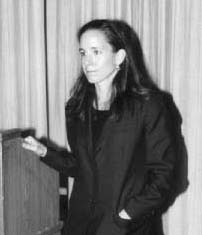Stuart Wells: The Reassertion of Collective Responsibility in Public Education
In her third and final Sachs Lecture, Amy Stuart Wells, Professor of Educational Policy at UCLA, spoke about "Lessons from Free Market Reforms of the 1990s: The Need to Bring Equity Back into Educational Policy Debates." In her opening remarks, she said, "My hope is that by the end of my three Sachs lectures, I will have adequately conveyed the need for a new policy discourse about the role and possibility of public education in a democratic society."
In discussing the focus of her third lecture, Stuart Wells added, "I want to examine the relationships between our age-old resistance to the ideal of the common school and redistributive, equity-based policies in education, and a neo-liberal, free market ideology that, in the last decade in particular, seems to have reshaped our understanding of what is politically possible."
Stuart Wells clarified what "liberalism" currently means in the United States and its historical impact on public education. "I do want to point out that there is a problem with the terminology of ?neo-liberalism' in the U.S. Since the 1920s when progressive writers began to use the word ?liberalism' as a substitute for ?progressivism,' the term ?liberal' has been used to describe those who embrace an activist and interventionist government. Meanwhile, in most other parts of the world, ?liberalism' means the exact opposite: market liberalism, meaning a reduced role for the state, economic freedom and reliance on the market forces-not government intervention to achieve the greater good."
When discussing where neo-liberalism meets educational reform, Stuart Wells made it absolutely clear that "one of the most obvious targets of neo-liberal ideology and reform is our state-run public educational systems. In a country like the U.S. where historically, there have been relatively few state-owned or operated industries, the public educational system has been the recipient of more than its share of neo-liberal attacks."
"It should come as no surprise," Stuart Wells commented, "that much of the political conversation about educational reform in the 1990s was, in part, patterned after discussions of global capitalism and framed by a neo-liberal ideology that calls for market solutions to all social ills."
Stuart Wells then outlined some of the salient neo-liberal educational reforms. One of the reforms has been the "deregulation of the student assignment process via greater parental choice, via contracting out with private for- and non-profit firms to run schools." Another major initiative aims to weaken teachers unions. "Thus to neo-liberals, a free and universal system with unionized employees with benefit packages represents the incredibly expensive welfare state that competitive societies can no longer maintain."
"Now that we have lived with the ideology of the free market reformers in education for more than a decade," Stuart Wells said, "it is time to take stock of what we have learned thus far about the policies and programs that have been implemented as a result."
One major finding from studies of deregulated market-based education is greater stratification and segregation. School choice programs "tend to increase racial, ethnic and social class segregation at the school level. Indeed, most of the research suggests that in deregulated, market-driven school choice policies, the schools-particularly the popular and over-subscribed schools-have more choices than the parents. These findings seem to run counter to claims by free market reformers that deregulated school choice policies will provide all parents with more educational choices, especially those who have the fewest options in the traditional system."
"The empirical evidence is mounting," Stuart Wells stated, "that when given the choice, more middle class, better educated, and white parents pay more attention to the status and backgrounds of the other children in the schools they are choosing than they do to ?objective' measures of school quality. Research, Stuart Wells continued, also reveals that neo-liberal reforms in education are not providing greater achievement. "Even if we were willing to forego ?equity' for the sake of ?excellence' in terms of the recent wave of deregulatory reforms in education, we are not yet seeing any strong and consistent findings in the research literature that the invisible hand of the market is increasing student achievement overall."
Stuart Wells concluded, "My point here is that the empirical evidence to date-when looked at in aggregate-provides virtually no support for continuing down the path of deregulatory free-market policies in education."
"We need to step back from the rush to make the educational system more efficient and question the current role for public schools in an increasingly unequal capitalist democracy. Are the schools to reflect the capitalist nature of our nation more so than its democratic nature? If not, then we need to rethink the political possibilities for making publicly funded schools sites of true democratic discourse and deliberation."
"Part of the challenge," she said, "must be to move away from atomized decision-making to the reassertion of collective responsibility, without recreating the very bureaucratic systems whose shortcomings have helped to legitimize the current tendency to treat education as a private good rather than a public responsibility."
Published Tuesday, Sep. 18, 2001
